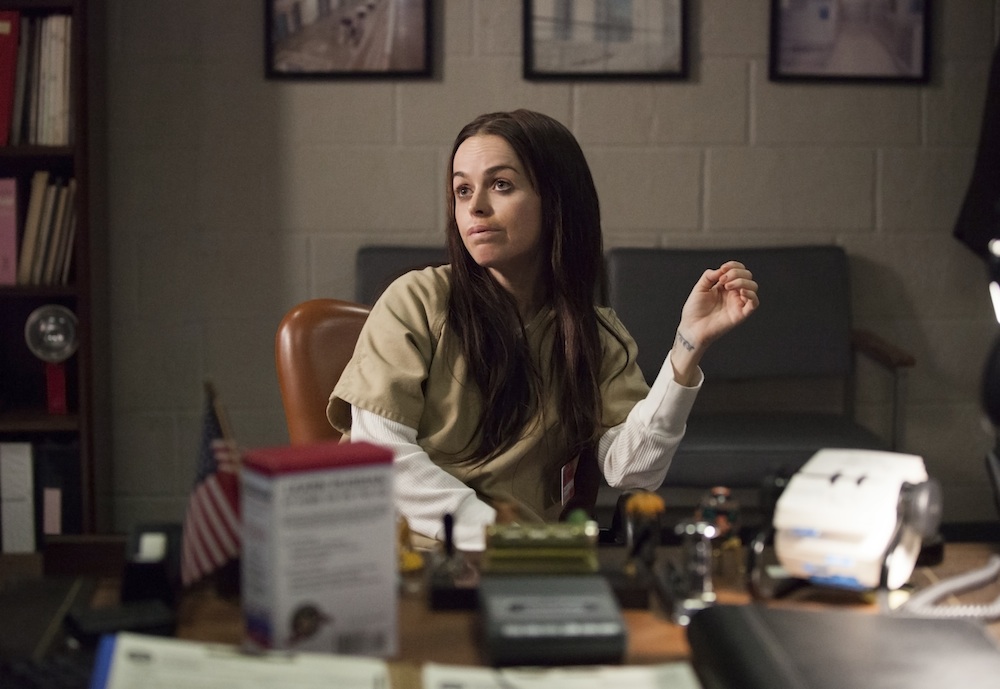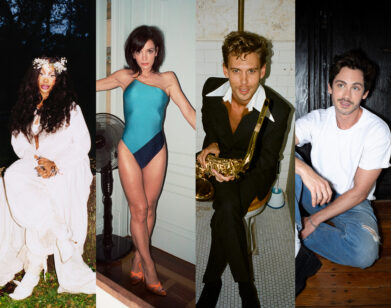Flowing with Taryn Manning

ABOVE: TARYN MANNING AS PENNSATUCKY IN ORANGE IS THE NEW BLACK. PHOTO COURTESY OF JESSICA MIGLIO FOR NETFLIX.
Taryn Manning, the singer-songwriter, fashion designer, former karate champion, and actress, is now 36 with bleached-blonde hair. Over the last 15 years, Manning has made a name for herself playing outsiders—from a pregnant teen in Britney Spears’ Crossroads (2002), to Eminem’s ex-girlfriend in 8 Mile (2002), a prostitute in Hustle and Flow (2005), and, most recently, a heroin addicted prostitute in Low Down and a meth head-turned-Jesus freak named Tiffany “Pennsatucky” Doggett in Netflix’s Orange is the New Black. Her signature gravelly voice adds a certain instensity to her roles—her character on OITNB, for example, has been described as someone who sounds like she ate cigarettes for breakfast.
When we met the friendly and jocular Manning at the Highline Ballroom earlier this month, however, it was under different circumstances: she was in her DJ booth at the tumultuous Paradisio Electric show. It also happened to be her birthday. The show, which will next travel to Miami, Florida, features rock and electro bands including Liquid Blonde, Kayvon Zand, Eva & Her Virgins, Prince Malik, HRT BRK, and J-IDRIS, whom Manning is collaborating with on a new song. Manning and her brother Kellin have been recording as an electronic pop duo Boomkat since 2003.
GERRY VISCO: Happy Birthday! I know you’ve been busy.
TARYN MANNING: Oh thank you! I’m going to dinner tonight with some friends and some of the girls from the show I’m on. We’re going to my friend’s restaurant, Chalk Point Kitchen. It’s all locally grown sustainable vegetables.
VISCO: Do you cook at all?
MANNING: Yes, I do. Not a lot. Sometimes I feel like if it’s not for a group then it goes to waste. By the time you fix the meal you’re full from the smells.
VISCO: This weekend you’re DJing for the Paradisio Electric show. Do you DJ often?
MANNING: I DJ very often. I’ll probably do it more. I’m not available during the week because of the show but I travel most weekends to DJ. I’ve been doing it for about six years.
VISCO: What’s your set usually like?
MANNING: My set consists of dance music, top 40 remixes, progressive house, deep house, even trap or dubstep, and a little hip-hop, [but] more in New York, on the East Coast. I’ll also throw in some ’80s.
VISCO: Are you a party girl yourself? Or do prefer just working at the party?
MANNING: No, I won’t even take jobs where you get paid to sit with a group of friends and party. That’s never been my vibe. I’m not like, “Oh, look at me—I’m partying with all my free bottles and getting paid for this.” I like to contribute. Even in my bands, I can’t really just be the singer. In my band Boomkat I play guitar. I like to contribute to the sound and the happiness. Watching people party is cool, but I don’t love watching people get super-duper trashed and annoying. I feel protected behind my booth—away from the madness, but a part of it too.
VISCO: You’re a business person–you have your recording studio and your own fashion company.
MANNING: I appreciate you recognizing that. I grew up with a wonderful mother who sacrificed her entire paycheck to me. I was taking karate, gymnastics, dance—those things are very expensive. I don’t know how she did it, but she pulled it off. I’d always say to her, “Mom, are you ever going to change or wear some nice shoes?” She didn’t buy herself anything while I was growing up because it all went to me. So if something slows down, I figure out other ways to make money. It comes from an urgency to survive, but I’ve made money doing things I love. DJing was a hobby. When I bought my turntables my mom said, “Oh what now, Taryn?” But it became pretty fruitful right away. I come from a very music-oriented family.
VISCO: Do you prefer music or acting?
MANNING: People ask me that a lot. With acting, I get to escape into this character and embody it. With music it’s like, “Hey guys, this is my diary, here’s all my feelings.” I write most of my stuff. When I’m rejected in music, it hurts worse than when I don’t get a role, because that’s someone else’s vision. If they don’t see me as that part, even if I believe I’m the perfect person for it, that’s their vision. The music is my vision.
VISCO: Orange is the New Black really took off. Does it take up a lot of your time?
MANNING: I always tell people my life changed in three days. I had three days to accept the role and find a place in New York. My life has been forever different since that call.
VISCO: You’re having fun? You’re enjoying it?
MANNING: Absolutely. I love it. I’ve had an interesting time adjusting to New York. I’m from California and I’m very much a California girl, but by now New York now feels like one of my homes. I feel lucky to officially say I’m bi-coastal.
VISCO: As an actress, you always play such interesting characters.
MANNING: You’re probably the only person who’s been polite enough to put it that way. They usually say, “Oh, you play some pretty effed-up people, huh?” After Hustle and Flow, I got several offers to play prostitutes. I was like, “No, I just played a prostitute.” Don’t these directors have a vision? Wouldn’t they want to discover another actor who could do what they’re looking for? I went really stubborn. I was like, “No I’m not taking anymore roles as prostitutes or junkies or ‘girls down on their luck.’ I’m going to play the girl next door and that’s that.” Then it got really quiet. The notion of being a character actress was somewhat devastating for me, because I didn’t understand what that meant. I didn’t go to college for theater, but I did do a lot of studying I was at this hole in the wall in Burbank learning real-life stuff about acting—like what a mark is, what slating is, so when you’re on set and all this language is going on around you, you come off as experienced even if you’re not–as well as a lot of scene study. Anyway, it was quiet for a while. Then I understood what it meant to be a character actor. It didn’t mean that I wasn’t revered. It takes all the colorful characters to elevate the lead. I get that now.
VISCO: How did this role come up? You’d been doing lots of different stuff.
MANNING: I got the offer and didn’t realize they’d been reading for all the characters with tons of local New York actresses. I still don’t really know how it happened. God works in mysterious ways. I was going through a period where I wasn’t doing very well, I wasn’t getting a lot of work. When I got this call I was going through a really tough time. I’d gotten two parts—had two major auditions and had gotten both the roles–but then all of a sudden they were both taken. I’d gotten the call from my manager, “You’ve got the part”—the best call ever—and then a day later I got the call “They’ve decided to go a different direction.” Instead of panicking, I just surrendered. I looked at my bank account and thought “Okay, at this rate I can last another year with my overhead.” And I let go. I didn’t cry. I didn’t bitch. I laughed, “how ironic.” Then three days later I got this call. When you truly let go, everything comes. You just go “Fine. It’s not going to be a good year and I accept it.” You’ve got to take your hands off the wheel. There’ll be highs and lows. My mom would always say, “Don’t get too high in the highs and don’t get too low in the lows.” I implemented that lesson!
VISCO: What are your projects coming up in the next couple of months?
MANNING: This show has brought amazing opportunities. It was cool because I got to host the GLAAD Awards in San Francisco–I was the goofy host of the night. I wanted to show people I have comedic skills. And I got to host the red carpet for the AMAs, or a portion of it. I’m also doing a movie in my hiatus, called Swing State, in Seattle. I’m doing a voiceover animation project, a super weird, edgy anime project. I love doing voiceover stuff.
I also have my own web series. We just shot the first episode that I directed, which turned out hilarious. It’s a comedy, called Shit Happens. I’m gearing up to shoot the next one. I have a single coming out December 16, which will go right to radio in the U.K., which is cool. Maybe I’ll even take a little bit of a vacation, God forbid.
VISCO: How long is the hiatus?
MANNING: Six months. But whenever there’s free time, music is my focus.
VISCO: Are you still doing Boomkat?
MANNING: Yes, Kellen—my brother—and I are still writing music for Boomkat. Our records have come out. They take about seven years per record. [laughs] Right now I’m doing a solo project, honing in on a sound. I have so many songs, it’s ridiculous. I love so many different types of music and tend to write all over the map, style-wise. R&B, rock ‘n’ roll, screamers, pop, good-time songs.
VISCO: What kind of a theme are you going with?
MANNING: The album is called Freedom City. I’m into the notion of living a life of freedom. Not that you’re not accountable, but in the sense of breaking the chains of our own minds, freedom from our own debilitating thoughts. I say this because it’s something I can do. Freedom City is a state of mind—living in the moment, because we don’t have control of much.
VISCO: Does that philosophy come from your study of karate?
MANNING: It could have come from my martial arts days. I became number one in the state of Arizona for two years—co-ed—in my age division. I was taught a lot of discipline that probably rolls over into other parts of my life. You’re not supposed to attack back until you’re attacked. You never take your skills and abuse them. I knew I could be lethal to someone my size. Not so much anymore. My dad died when I was 14. It was very sudden, traumatic, and confusing. I always felt I could have gone down a bad road at that point, but I made a choice to be a winner. Everyone thinks I’m some big drug addict and loser because of the parts I play—quite the opposite. I decided to be a winner. I don’t know if I wanted to make him proud, or just numbing depression half my life. It’s a blessing and a curse, what happened at that age. Those were formative years.
VISCO: Do you think it’s unfair when people get mad at these celebrity DJs, like Paris Hilton?
MANNING: Yes, I do. I have nothing rude to say about anybody who is having fun in life. I know Paris. She’s a good friend. Paris Hilton is a lover of life, an unapologetic person who couldn’t give a shit what any of us think of her. She’s my hero because of that. I don’t know if she’s any good as a DJ—I haven’t seen her myself. But I tell her that I’m proud of her because she loves music.
VISCO: Paris certainly knows nightlife.
MANNING: She knows nightlife, she’s adorable, she’s fun. She gets up on the stage and owns it. That’s all I ask—confidence and owning it. She’s much more of an artist than people know. She’s not the greatest vocalist, nor am I. She may have gone out too many times for us to believe she actually works at all, but she’s a genius. She’s made money doing everything under the sun. She certainly doesn’t need it.
VISCO: There’s a lot of criticism and backlash when people make it big.
MANNING: Yes, the industry builds people up to break them down. But also there’s the pre-conceived notion that she comes from money, and that nothing she’s doing is genuine. She could be lying on a beach every day but she’s doing her thing.






